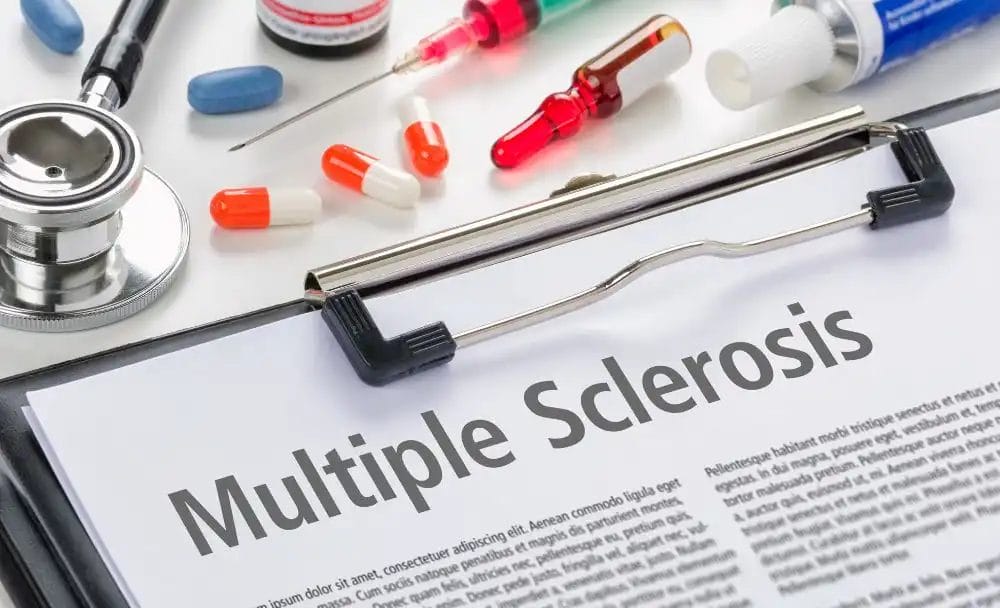This article is reviewed by an expert

Curious about multiple sclerosis (MS)? If yes, then keep reading.
This article covers all the aspects of multiple sclerosis and more. It also explores the Ayurvedic approach for MS, including herbal remedies and therapeutic procedures that can help support overall well-being.
What Is Multiple Sclerosis (MS) (1)?
Multiple sclerosis (MS) is an autoimmune disease characterized by the immune system’s mistaken attack on healthy cells.
In this condition, the immune system starts targetting the myelin, the protective covering surrounding nerves in the brain and spinal cord and disrupts the transmission of nerve signals from the brain to various parts of the body. As a result, you may experience a range of symptoms affecting the brain, spinal cord, and eyes.
Multiple Sclerosis Types (1)
There are four main types of multiple sclerosis:
Clinically Isolated Syndrome (CIS)
This occurs when someone has their first episode of MS symptoms. Healthcare providers often categorize it as CIS, but not everyone with CIS goes on to develop full-fledged multiple sclerosis.
Relapsing-Remitting MS (RRMS)
This is the most common form of MS. Individuals with RRMS encounter flare-ups, also known as relapses or exacerbations, where new or worsening symptoms emerge. These flare-ups are followed by periods of remission, during which symptoms stabilize or disappear.
Primary Progressive MS (PPMS)
People diagnosed with PPMS experience a gradual and steady worsening of symptoms without any periods of relapse or remission. Symptoms of PPMS slowly and continuously progress over time.
Secondary Progressive MS (SPMS)
Many individuals initially diagnosed with RRMS eventually transition to SPMS. With secondary-progressive multiple sclerosis, nerve damage continues to accumulate, resulting in progressively worsening symptoms. Although there may still be some relapses or flares, periods of remission no longer occur.
Multiple Sclerosis Causes (1)
The exact causes of multiple sclerosis (MS) are still not fully understood, but ongoing research aims to shed light on this complex disease. Several factors have been identified that may contribute to the development of MS, such as:
- Infection: Some research suggests that certain viruses and bacteria, like the Epstein-Barr virus, may trigger MS later in life.
- Geographical Location: Regions farther from the equator, with lower sun exposure and consequently lower levels of vitamin D, have been found to have higher rates of the disease.
- Immune System Dysfunction: Researchers are still investigating why dysfunction in the immune system occurs, but this is the primary cause of MS.
- Genetic Mutation: Having a family member with MS may increase the risk, but the specific genes and mechanisms involved are still not fully understood.
Multiple Sclerosis Symptoms (1)
One of the main symptoms of multiple sclerosis is vision problems, such as optic neuritis, which can cause blurriness and pain in one eye.
Other common symptoms of MS include changes in gait, fatigue, loss of balance or coordination, muscle spasms, muscle weakness, and tingling or numbness, particularly in the legs or arms.
Multiple Sclerosis Diagnosis (1)
Diagnosing multiple sclerosis (MS) is a comprehensive process that involves various examinations and tests.
A neurologist usually performs a physical examination and prescribes blood tests and imaging tests such as MRI to look for evidence of lesions in the brain or spinal cord, indicating MS-related damage to the myelin sheath.
In some cases, a spinal tap (lumbar puncture) may also be necessary to gather further information. If these tests do not provide a clear diagnosis, a neurologist may even recommend an evoked potentials test to assess nerve function by measuring electrical activity in the brain and spinal cord.
Multiple Sclerosis Modern Treatment (1)

The modern treatment approach for multiple sclerosis (MS) aims to manage symptoms, reduce relapses, and slow the progression of the disease. A comprehensive treatment plan may include the following:
- Disease-Modifying Therapies (DMTs): Usually the most common mode of treatment, DMTs help reduce relapses, slow down disease progression, and prevent the formation of new lesions on the brain and spinal cord.
- Relapse Management Medications: Usually prescribed in the case of a severe attack, high-dose corticosteroids help to quickly reduce inflammation and prevent damage to the myelin sheath surrounding nerve cells.
- Physical Rehabilitation: MS can impact physical function, and physical rehabilitation can help maintain physical fitness and strength and preserve mobility.
- Mental Health Counseling: Coping with a chronic condition like MS can be emotionally challenging, and it may affect mood and memory. Seeking support from a neuropsychologist can help deal with the disease better.
Multiple Sclerosis Ayurvedic Treatment (2)
The Ayurvedic approach to multiple sclerosis (MS) focuses on addressing imbalances in the body and supporting overall well-being. It promotes the use of herbs such as Ashwagandha, Jeevanthi, Guduchi, Yashtimadhu and Vidari, many of which have been studied and are regarded as potentially effective in the treatment of MS, by reducing the demyelination, improving remyelination and suppressing the inflammation in the CNS 3.
In addition, a case study examined the efficacy of various Ayurvedic therapies that were used to treat a patient with MS, providing validation for the following therapies 4:
- Panchakarma: Panchakarma involving the use of Ruksha churna pinda sweda, Takra dhara (therapeutic buttermilk dripping), Talam and Kshara basti.
- Snehapanam: This is administered 10 days later after Virechana – it involves the use of ghee-based formulations like Rasnadi Ghritha, Jeevantyadi Ghritha, or Vidaryadighritha
- Shirodhara: Pouring medicated oil such as Rasnadi Taila, Mahamashataila, or Ksheerabalataila on the forehead
- Ksheeradhara: Applying a herbal milk decoction prepared with Dasamoola and Ashwagandha
- Thalam: Application of herbal powders like Jeevanthyadi Choornam or Vidaryadi Choornam along with oils like Ksheerabala or Sahacharadi
- Akshitarpanam: Nourishing the eyes with Triphala Ghritha or Jeevanthyadighrita, especially for blurred vision in MS cases
- Ksheeravasthi: Administering medicated enemas using a decoction of medicinal herbs
Researchers observed significant improvements after administration of Ayurveda therapy for MS, noting a reduction in symptoms, reduced pain and improved quality of life as per the VAS, FAMS and SF-36 Quality of Life Scale 4.
Multiple Sclerosis Prevention (1)
Preventing multiple sclerosis (MS) is not currently possible, but certain lifestyle choices can help manage the condition and improve quality of life. On a Final Note
- Take the help of disease-modifying therapies to reduce flare-ups and slow disease progression.
- Eat a healthy diet rich in fruits, vegetables, whole grains, healthy fats, and lean proteins.
- Limit intake of added sugars, unhealthy fats, and processed foods.
- Engage in aerobic exercises, flexibility training, and strength training to maintain physical function.
- Manage stress with stress management techniques such as yoga, meditation, exercise, or counselling.
- Avoid smoking and limit alcohol consumption.
On a Final Note
Multiple sclerosis (MS) is a complex autoimmune disease that affects the central nervous system. Understanding the symptoms, types, and causes of MS can help in timely diagnosis and effective treatment.
FAQs (1)
- Can multiple sclerosis (MS) cause depression?
Yes, depression is common in people with MS, potentially caused by the challenges and stress of living with the condition.
- Can MS treatments also contribute to depression?
Yes, certain medications used to treat MS, such as steroids or interferon, may have depression as a side effect.
- Does temperature affect MS symptoms?
Heat or high humidity can temporarily worsen symptoms in many people with MS, while extremely cold temperatures and temperature changes can cause flare-ups, often manifesting as spasticity.
- What complications can arise as MS progresses?
Worsening MS symptoms may lead to complications, such as difficulties walking, loss of bowel or bladder control, memory problems, and sexual difficulties.
Disclaimer: This article is written from a health and lifestyle perspective. It is for general information and not meant to substitute any medical advice. Please consult your doctor for appropriate medical consultation.
















